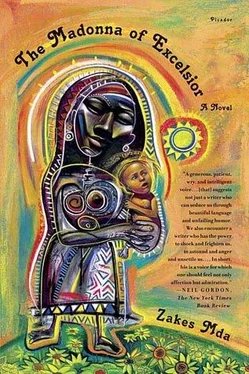“How dare you judge?” responded a white male spectator. “These men are innocent. They have been framed by the blacks. Oom Groot-Jan Lombard occupies a place of honour in this community. He will continue to occupy it after this trial because he is innocent.”
While the spectators were debating the black conspiracy, two other accused arrived. We did not know them. They must have come from outlying farms. Later we heard that one of them was a policeman.
The Reverend François Bornman was the last to arrive, accompanied by his sickly wife. They were both in funereal black. If ever there was a person who had been framed, then it had to be the dominee, we all agreed. We knew of him as a man of God who preached obedience to His laws. Laws against adultery and miscegenation. Why, he had even been responsible for running Konstantin Dukakis and his sinful family out of town.
Dukakis was a silver-haired Greek who had come to Excelsior ten years earlier to establish a corner café. We remembered him very well because he had punched a few of us when we had complained that the fish he had sold us was stale. Or that the chips were charred. He would hurl our change at us. We would chase the coins as they rolled on the concrete floor. He and his son, Ari, found this most entertaining. Their guffaws would follow us as we fled the café, only to come again the next day for more doses of rudeness. What could we do? His was the only café that sold fish and chips, which we ate when we were giving ourselves a treat.
We also remember him for the glossy magazines that he sold at his café. He introduced to our town Kyk , a picture-story magazine whose pages took the citizens of Excelsior to great flights of fanciful romance. And See , which was the English version of Kyk . He also introduced Mark Condor , a picture-story magazine of adventure, spies and crime-busters. Issues of this used to circulate among our boys, who would hide them in their exercise books and read them in class. Then there was Scope , a magazine whose pages were full of white women with stars on their tits. If the Afrikaner men of Excelsior caught a black man reading Scope , they would beat him to pieces. Black men had no business ogling topless white women. But the brave men of Mahlatswetsa Location had no qualms about risking broken limbs by smuggling the magazine under their shirts. To this day, many of us believe that white women have black stars on their breasts instead of nipples.
Besides the young soldiers and their fathers who came to the café to buy Scope magazine discreetly, and the schoolboys who came to peek through its pages stealthily, the Afrikaner community kept Dukakis at a polite distance. They left him alone to bully the folk of Mahlatswetsa Location in peace. Until one night when his son, Ari, was caught necking in Dukakis’ old Studebaker with Jacomina, the Reverend Bornman’s daughter. The Afrikaners of Excelsior, led by the dominee himself, could not hide their outrage. They said Greek boys had no right to smooch with Afrikaner meisies. Greeks were not white enough. They were no different from the Portuguese. Greeks were wit kaffirs. They put it to him frankly that the likes of him were no longer welcome in Excelsior.
The Dukakis family had had to pack up and leave.
ADAM DE VRIES. Mayor of Excelsior. Elected by the town council only a month before the erstwhile mayor, Stephanus Cronje, took his life. District Chairman of the ruling National Party. With the emphasis on ruling . His gait befitted that of the attorney of record of the five white men accused of sleeping with black women. He walked to the dock to confer with his clients in a manner that would have been august if only he had been of bigger stature. His stride was that of a man savouring moments of glory. Here at last was a case that would afford him the opportunity to display his greatness as an attorney-at-law. Not the petty stock theft cases that occupied most of his time. Not the tedious drawing of wills and deeds of transfer and the administering of estates of deceased farmers.
He whispered something to Johannes Smit, but went quickly back to his table when the accused women were led into the courtroom. Fourteen black women, twelve with babies in their arms or strapped to their backs. Gasps from the volk, packed into the gallery, at the sight of so many coloured babies. The gallery had been full one hour before the trial. Spectators came from as far as Reddersburg, one hundred and forty-five kilometres away. Hairy farmers in safari suits with combs in their socks. Wives in floral dresses and wide-brimmed straw hats. Tannies carrying picnic baskets and Thermos flasks of strong coffee.
None of us were allowed to sit on the seats. Those few of us who could get into the courtroom stood against the wall at the back.
We saw the court orderly policeman arrange the women so that each of them stood next to the man she was being charged with. He read the names of the women from a sheet of paper. When a woman acknowledged her name, she was pulled by the arm to the spot where the law had determined she belonged.
Johannes Smit was charged with five women, one of whom was Mmampe. Groot-Jan Lombard with two. The Reverend François Bornman with two, one of whom was Maria. The farmer we did not know was charged with three women, and his policeman friend with one. Niki was charged alone, since Stephanus Cronje no longer walked this earth.
General nervousness and fidgeting among the men and women of Excelsior and its environs, as they stood side-by-side in the dock.
Klein-Jan Lombard, in his neat police officer’s uniform, entered and sat at the prosecutor’s table, next to the prosecutor, Christiaan Calitz. We wondered how he had escaped arrest, as the women of Mahlatswetsa Location had revealed at stokvels and at the fundraising gatherings of the Mothers’ Union that he had also occasionally indulged in the wicked pleasures. Now here he was, ready to prosecute his own father.
When the burly magistrate, Karel Bezuidenhout, entered, all those who were sitting down stood up. Including Adam de Vries, Christiaan Calitz and Klein-Jan Lombard. Those of us who had been leaning against the wall stood up straight. Karel Bezuidenhout surveyed his court, then sat down. The rest of the people sat down too. We leaned against the wall.
“One of the accused is your close relative,” said the magistrate, looking at Klein-Jan Lombard kindly. “You cannot prosecute this case.”
“I thought I could perhaps assist Mr Calitz, Your Worship,” said Klein-Jan Lombard humbly.
“I have no doubt that you are a man of integrity,” said the magistrate patiently. “But you’ll still have to recuse yourself. Mr Calitz can manage fine without you.”
Klein-Jan Lombard made a deep bow in front of the bench, and walked out of the side door that led to the prosecutors’ and magistrates’ offices.
The prosecutor said that the women had all agreed to plead guilty and thereafter to give evidence against the white men. This obviously came as a shock to Adam de Vries. He stood up in a huff.
“They are accomplices!” he cried. “Their evidence alone will not be enough to convict my clients.”
“My learned friend should not worry about that,” said Christiaan Calitz with a wicked smile. “There are other eyewitnesses. And of course there are the children. Blood tests have been carried out on the accused and the children.”
He looked at the babies benevolently.
Popi made friendly noises in Niki’s arms. Niki fondled her face.
The magistrate said the court was not dealing with the merits of the case at that moment. The proceedings would be adjourned until the following week. Bail for the women would be set at fifty rands each.
Читать дальше












